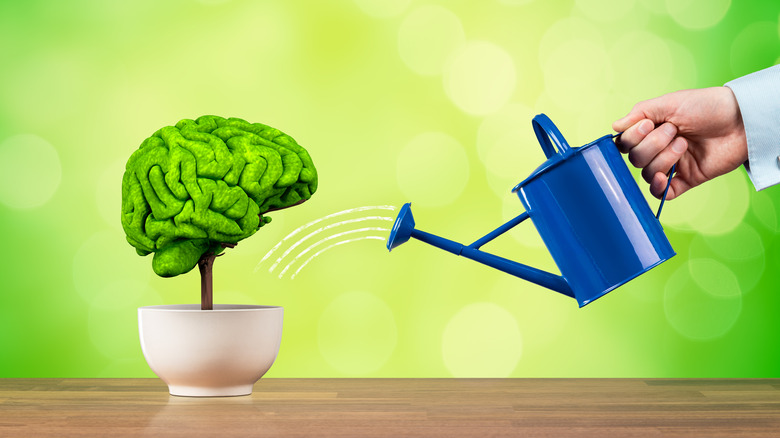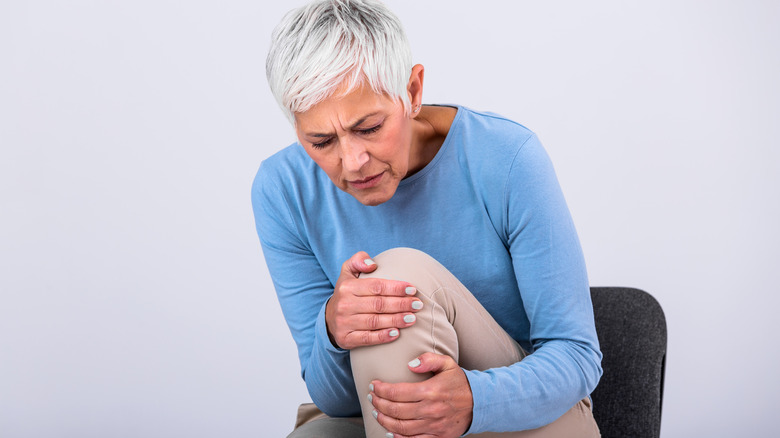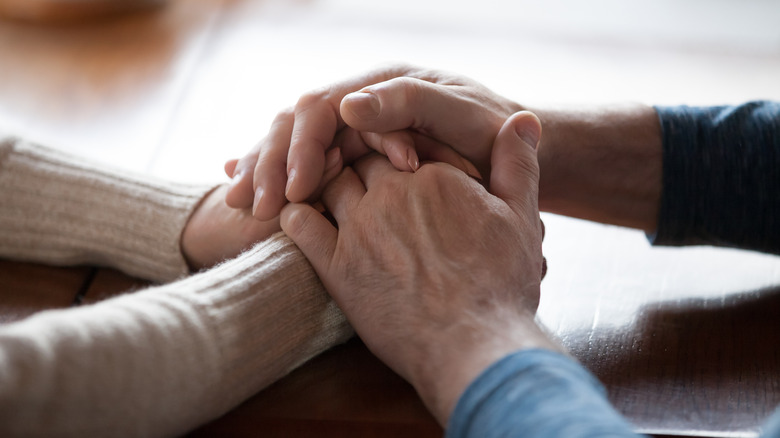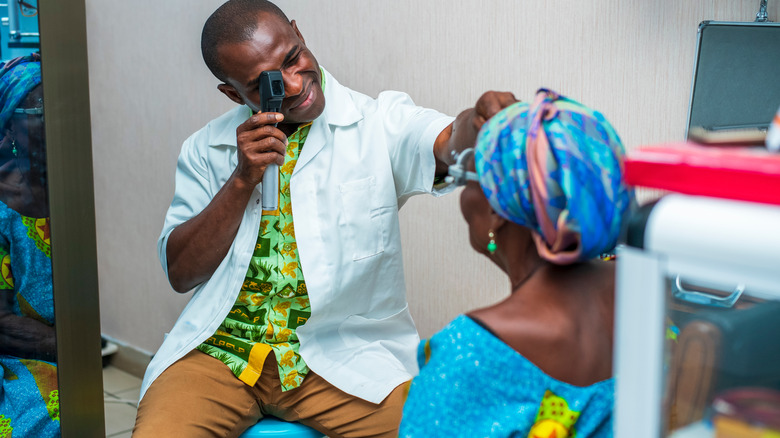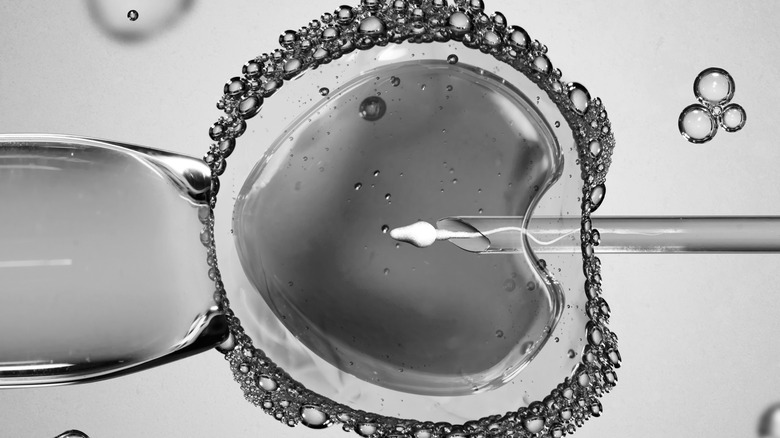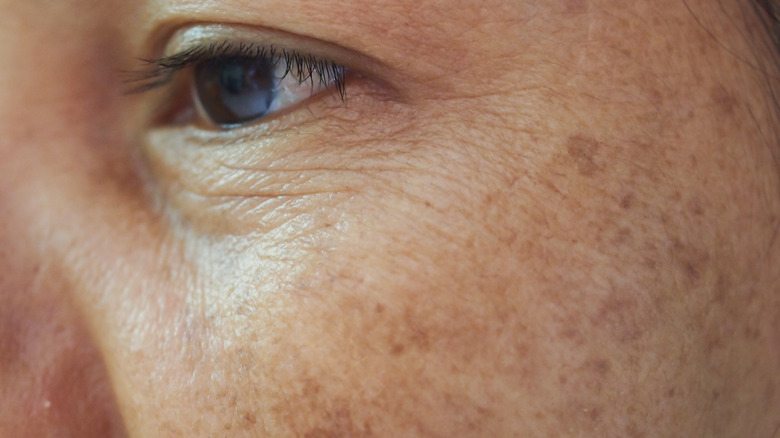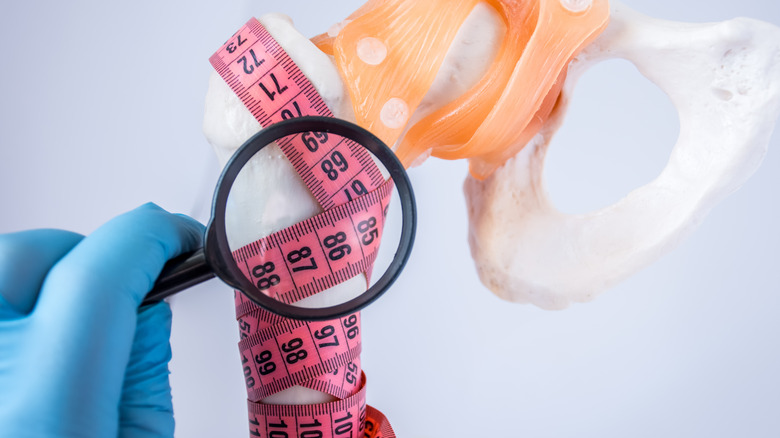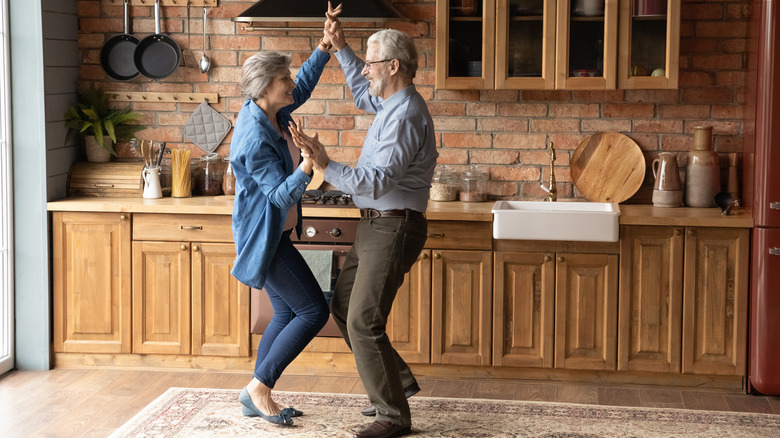Things That Happen To Your Body After You Turn 50
"Aging," according to the late rock musician David Bowie, who died in 2014 at 69, "is an extraordinary process where you become the person you always should have been" (via Senior Planet). It's also not for the faint of heart — both literally and figuratively. Injectables, extreme workouts, and pristine nutrition aside, there's no getting around the fact that from the moment that we "bloom" into adulthood, we also begin a gradual decline that, assuming that we live long enough, will likely leave our skin wrinkled, our hair thinner and paler, our stature stooped, and our midsections thicker. And those are just the changes that are observable by the naked eye. As we age, our bodies will change in myriad ways of which you may not even be aware, at least not consciously.
However, not every change that aging brings about is a downgrade. For instance, we may come into our peak physical strength in our 30s (via Runner's World), and might finally have the best sex of our lives starting at age 40 (via The Healthy). In fact, clichés abound about how "30 is the new 20" and "40 is the new 30." But the obvious question is: what happens to your body after you turn 50? You could ask Jennifer Aniston or Zach Galifianakis, both of whom turned 52 this year (per IMDb). Or, you could simply keep reading.
Your brain function will peak
Aging is often associated with a decline in cognitive function, especially memory. And if you think about it, that makes sense because, yes, ultimately, "aging" in a general sense will lead to such decline, not to mention death. However, it is no longer considered scientifically accurate to assume that the decline in mental capacity begins when you turn 50. In fact, the truth is apparently something else entirely.
According to WebMD, before age 50, the human brain has not even reached peak performance levels. While WebMD estimates that a decline may begin at around age 55, other sources such as AARP hold that the brain's capacity to learn remains strong well into the seventh decade of life (via AARP). And a recent study published in 2021 in the journal Nature Human Behavior demonstrates that some of our "key" brain functions have a tendency to improve after we turn 50 — specifically, the ability to attend to new information and to remain focused, notwithstanding distractions. In case you're wondering how important these functions are, according to the Georgetown University Medical Center, together they "underlie critical aspects of cognition such as memory, decision making, and self-control, and even navigation, math, language and reading."
Your sense of smell might decline
Your ability to smell is linked not only to the condition of your nose and nasal passages, but also to the condition of your nervous system, according to otolaryngologist Jayant M. Pinto (via AARP). After you turn 50, your sense of smell may begin to decline — albeit slowly and subtly — because not only does your nose begin to produce less mucus at this time in your life (which means that aromas are no longer able to "stick" around for quite so long in your nose, according to Rush University), but in addition, the nerves connecting the brain to the nose begin a slow process of deterioration which will continue throughout your life. In fact, by the time you turn 70, you may have noticeable difficulty detecting the smell of smoke or gas, according to the National Institutes of Health. Certain routine conditions that go along with the aging process aging can also interfere with one's sense of smell, including sinus infections and allergies.
Nasal decline may also have an emotional impact: "Odor signals travel directly to some of the oldest parts of your brain, including to areas connected to memory and emotions," Dr. Pinto explained to AARP Health. That means that whereas in the past, the scent of "Christmas cookies or Grandma's brisket" may have awoken beloved memories, after 50, maybe not so much.
Tastes may not be as strong
After you turn 50, you have a brand new opportunity to revisit various foods that may have tasted too "strong" for you during your younger days. That includes a number of foods that are known to support vibrant health, such as cruciferous vegetables like broccoli (via AARP) and fermented foods like kimchi. The reason is that taste perception abates as we get older, according to Christine Gerbstadt, MD (via Everyday Health). Though researchers don't completely understand why this happens, some experts — including Nancy Rawson, the associate director of the Monell Chemical Senses Center in Philadelphia — posit that the cells that make up our taste buds, which are always turning over and regenerating throughout our lives, may begin to do so more slowly after 50 (via AARP Health).
In addition, the fact that our smelling capabilities begin to decline at 50 (via National Institutes of Health) has the effect of diminishing our ability to discern tastes, according to Brain Facts, which explains that "messages about taste and smell converge, allowing us to detect the flavors of food." As we age and our sense of smell becomes less acute, we come to rely more on more on our taste buds alone, and the perception "won't be as strong or as complex," according to Everyday Health.
Your pain threshold might increase
Something else that happens to your body after you turn 50 is your sensitivity to pain may appear to diminish, according to MedlinePlus. Indeed, a 2017 clinical study demonstrated that one's "pain threshold" increases as we age (via Neuroscience and Biobehavioral Reviews). What that means is that even though you may recognize that you are experiencing a sensation, it may take a bit more time to register that the sensation is pain (per Science Direct).
One of the factors behind this diminished sensitivity is decreased circulation, which is an inevitable reality of aging (via Medline Plus). Accordingly, people in their 50s who are already predisposed to impaired circulation, including those diagnosed with diabetes and/or high blood pressure, may be at a higher risk of injuring themselves because it may take them longer to recognize the seriousness of an injury or condition, or to pull back from painful stimuli. That said, actual "pain tolerance" — the length of time before you find pain "intolerable" — is not shown to increase (via Neuroscience and Biobehavioral Reviews).
Your sensitivity to touch diminishes
Just as our pain threshold would appear to increase as we age (per MedlinePlus), our skin's ability to detect non-painful touch also tends to decrease with age, according to a 2016 research paper published by Oklahoma State University. The easiest way to understand this is to recognize that our skin, which is actually the largest organ of the human body, is loaded with millions upon millions of nerve endings, the optimal function of which requires optimal blood flow. However, decreased circulation is inevitable as we age, leading to a sensory decline (via Medline Plus). In fact, around 30% of people aged 50 and above report that their "sense of touch isn't what it used to be," reports AARP, and an additional 30% identify their sense of touch as having grown "downright poor."
Although you might assume that a decrease in the ability to detect light touch would be fairly inconsequential, the fact is that some experts see it as potentially devastating. "People thrive on stimulation through touch," says Youmasu J. Siewe, Ph.D. (via Oklahoma State University). "Without it, humans often feel a longing or aching. We can survive without sight, hearing, taste, or smell, but without touch, we are at great risk of mental breakdown." Nevertheless, it's possible to improve circulation by getting regular exercise, according to Rush University, and this could help to preserve your ability to detect and enjoy your sense of touch long after turning 50.
Your most athletic days may be behind you
Our sense of touch plays a role in our ability to remain steady on our feet, according to Winnie Dunn, chair of the Department of Occupational Therapy Education at the University of Kansas Medical Center (via AARP). "Sensors" in the skin deliver important data to the brain regarding "where the body is in space," Dunn explains. Therefore, as our sense of touch diminishes, so too may our ability to balance. In other words, after you turn 50, you may start to feel somewhat more "unsteady or clumsy," as Dunn puts it.
A 2016 study published in The Journals of Gerontology lends support to Dunn's view. That study looked at a broad set of measures of athleticism, including "mobility, strength, endurance, and balance," in 775 people between the ages of 30 and 90 during the years 2012 and 2014. Researchers found that overall performance worsens with each passing decade. However, one of the first measures affected by age was balance. By the time the subjects were nearing 50, their ability to balance on one leg had already noticeably diminished, with their aerobic endurance and physical speed taking noticeable hits at age 50 and beyond.
You won't be able to hear as well
In 1997, it was big news when then-President of the United States, Bill Clinton, got fitted for his first hearing aids — one for each ear — when he was just 51 years old, according to the Los Angeles Times. At the time, the Los Angeles Times reported that Clinton's need for hearing assistance reflected both his "advancing age" as well as the saxophone-playing politician's exposure to excessively loud music over the course of his youth (via YouTube). Indeed, the National Institutes on Deafness and Other Communication Disorders reported in 2007 that about 20-30% of people have some hearing loss before the age of 40, with another 30% reporting hearing loss by the age of 59. As Rush University puts it, one in three adults over the age of 60 reports experiencing some degree of difficulty with their hearing.
Although aging is strongly correlated with hearing loss, the aging process itself is only partly to blame, according to Frank Lin, associate professor of otolaryngology at Johns Hopkins University in Baltimore (via Rush University). Rather, a "lifetime of noise — power tools, a loud workplace, that Who concert — along with normal aging can cause deterioration," Lin explains. Moreover, if you are over 50 and have been feeling a bit clumsy lately, it may also reflect a hearing impairment: "Balance gets thrown off when you can't hear your footsteps," Lin told Rush University.
You may become farsighted
Are you squinting at your screen right now? If so, that makes two of us, which is why it pains us to tell you that it's not the size of the font that matters. Rather, you may be dealing with farsightedness. For the uninitiated, "farsightedness" refers to a difficulty in focusing one's eyes on text and images that are up-close — like when you read a book or a menu or work at your laptop (via Rush University). "Sight — like all the other senses — gradually fades as a normal part of aging," according to geriatrician Magdalena Bednarczyk (via Rush University). One of the most common ways that age-related vision-loss presents itself is with farsightedness, which is caused by a decrease in the elasticity of the eye's lenses. When farsightedness develops in the ordinary course of aging, it is referred to clinically as "presbyopia," the eye-care professionals at NVISION Eye Centers note. And according to the authors of a 2012 study published in Scientific Reports, by the age of 51, "virtually everyone" finds themselves suffering from farsightedness.
The good news, however is that age-related loss of near-vision is "complete or nearly so" by age 50. That means that your near-vision is unlikely to become significantly worse as you continue to age past 50. The bad news is that once you turn 50, the odds are pretty good that you're going to need a lifetime supply of reading glasses.
Other vision issues may crop up
Although it appears that virtually no one makes it past 50 without having to deal with at least some level of presbyopia, also known as age-related "farsightedness" (via Scientific Reports), the need to hold your restaurant menu further and further away to read it is hardly the only change in vision that occurs as a result of aging (via Rush University). After you turn 50, you might also notice that you have more difficulty seeing when the lights are low. Geriatrician Magdalena Bednarczyk tells Rush University that "your pupils naturally shrink with age, so they can't let in as much light." By the time you graduate from 50 to 60, you may have well lost a full two-thirds of your pupil size.
Your risk of experiencing "eye floaters" also increases with age, and particularly after you turn 50, according to Cleveland Clinic. Eye floaters, which "appear in your field of vision as small shapes," or as flashes of light (in which case, they may be referred to as "eye flashes"), are another common vision-related consequence of aging. That's because they are caused by the "natural shrinking of the gel-like fluid in your eye (vitreous) that happens as you age." While other "vision-robbing conditions" such as glaucoma, cataracts, and macular degeneration become more common with age, according to Rush University, they are also less common than other eye- and vision-related issues.
Women experience menopause
For women, the onset of menopause signals the absolute end of fertility — as in, full stop, according to the American Society for Reproductive Medicine's (ASRM's) Reproductive Facts. Regardless of how frequently the word "menopause" may be misused in popular culture (via International Menopause Society), it is defined, clinically, as the occurrence of a woman's final menstrual period — which is the grand finale to that final menstrual cycle. The average age at which menopause is recorded in women is 51 (via the ASRM's Reproductive Facts). Prior to the onset of menopause, women go through as many as 10 years of what is known as "perimenopause." Although perimenopause is characterized by irregular periods caused by hormonal fluctuations and a gradual decrease in the levels of the hormones necessary for a woman to conceive and carry a baby to term, it is still possible for a woman in perimenopause to conceive.
Specifically, until a woman has not had a menstrual period in 12 months, she may, in fact, be capable of conceiving (via Healthline). Although the chances of conceiving diminish with each year after a woman's 24th birthday (via Kinderzeit), a 2012 study published in the American Journal of Perinatology, which followed the IVF-induced pregnancies of 101 women ages 50 and over, indicates that conception later in life is very much possibility, albeit with reproductive assistance such as IVF. In fact, Janet Jackson conceived at 50, according to Time.
Male fertility decreases
Whereas there is a definite point in time at which a woman's fertility fully ceases (menopause, via American Society for Reproductive Medicine's (ASRM's) Reproductive Facts), once a man begins producing sperm (at the onset of puberty, according to Planned Parenthood), there is no definitive end-point of which science is aware. Robert DeNiro, Clint Eastwood, Jeff Goldblum, Larry King, Hugh Hefner, and Nick Nolte have all managed to prove that a man can still father a child well into his 60s, according to Hollywood.com. Charlie Chaplin did so at 73. And some men do so well into their 80s, according to Oldest. All of this helps to bolster "the myth that men remain fertile all of their lives and can parent children as long as they can perform sexually," according to Healthline. But that's just it. It's a myth.
A study published in August 2021 in the Scandinavian medical journal Acta Obstetrica et Gynecologica Scandinavica demonstrates that male fertility declines dramatically once a man is over the age of 50 (via UPI). In a study involving 4,271 men whose female partners were trying to conceive via IVF or ICSI (intracytoplasmic sperm injection, per ASRM's Reproductive Facts) after a diagnosis of primary or secondary infertility, the likelihood of a live birth was 33% lower when the father was over the age of 50, as compared with younger men. Moreover, although IVF/ICSI pregnancy rates decline as women age, the results of this study were "independent of maternal age."
You're more likely to develop age spots
Wrinkles on the skin are an inevitable consequence of aging (via Cleveland Clinic). Another largely cosmetic consequence of aging is the development of "solar lentigines," which are much more commonly referred to — even in the clinical setting — as "age spots" (via Cornell University). We are singling out these aptly named skin lesions at this time because age spots, in particular, become increasingly common after you turn 50, according to Mayo Clinic.
Like freckles, age spots are brown spots that appear on the skin. Unlike freckles, once age spots appear, they are there for good, unless you have them removed in a clinical setting. Like moles, age spots may change in shape and color. Unlike moles, age spots are always benign (as long as they are, in fact, age spots, which can only be confirmed via clinical diagnosis and biopsy). Ultimately, what distinguishes age spots from other areas of hyperpigmentation on the skin, however, is the fact that they are the direct result of aging. "Aging of a tissue is the basis for development of age spots," according to Jicun Wang-Michelitsch and Thomas M. Michelitsch, who authored a paper on the topic for Cornell University. Adding insult to injury, the presence of one age spot can accelerate the development of others.
Retaining muscle mass takes more effort
Although some women complain of menopause causing weight gain, the bigger issue may be the gradual loss in muscle mass as we age (via Mayo Clinic). "After about age 50, muscle mass decreases at an annual rate of 1–2%," according to the authors of a 2010 study published in the Journal of Cachexia, Sarcopenia and Muscle, who went on to explain that the mechanism behind age-related muscle loss includes the gradual "denervation of motor units." In layman's terms, this means that over time, the connection between your nerves and your muscles diminishes (perhaps as a result of diminishing circulation, which is also inevitable with aging, according to Medline Plus). Along with losing mass, the strength of your muscles may also decline after you turn 50, according to the 2010 study authors.
Nevertheless, all is not "lost" after you turn 50. Older men can reverse age-related muscle loss through the practice of progressive resistance training, according to Harvard Men's Health Watch. "It takes work, dedication, and a plan, but it is never too late to rebuild muscle and maintain it," noted Harvard-affiliated Dr. Thomas W. Storer. Women can also reverse age-related muscle mass, but it does become more challenging (as compared to men) after age 65 (via Washington University School of Medicine).
Your bone health may suffer
When you hear the word "osteoporosis," does the image of a frail, stooped elderly person come to mind? Osteoporosis — which is the clinical word for the loss of bone density, as measured by a DEXA scan that evaluates the levels of calcium and minerals in the bones (via Medline Plus) — is a condition associating with aging, according to a 2012 research paper published in the Therapeutic Advances In Musculoskeletal Disease. However, the aging process begins the moment we hit adulthood, and osteoporosis can start to do its damage long before you ever become that frail, stooped, elderly person. For example, Gwyneth Paltrow, who turns 50 in 2022, has been dealing with bone loss, along with the resulting increased risk of bone fracture, for the past 11 years, according to London Osteoporosis Clinic.
"Women over age 50 years and men over age 70 years have a higher risk for osteoporosis than younger women and men," according to Medline Plus. However, make no bones about it, you can improve your bone density through resistance training, maintaining a healthy weight, consuming more calcium and vitamins D and K as well as more vegetables and protein, according to Medical News Today.
Your may be happier
You know how they say that youth is wasted on the young? Well, it turns out, it may not be mere lip service. In fact, when you turn 50, even with all of the of the rather vexing things that may happen to your body, there's a pretty good chance that you are standing at the threshold of some of the best years of your life, according to The Washington Post, citing the book, "The Happiness Curve: Why Life Gets Better After 50," by journalist Jonathan Rauch. "The optimistic, breezy title could easily be dismissed as wishful thinking," the Washington Post conceded. "However, Rauch's rosy projection is based less on new-age optimism than a review of a series of multi-country, big-data studies on happiness conducted over the past few decades." Apparently, "the findings by scholars from a range of disciplines consistently show that life satisfaction is U-shaped, with contentment high in the 20s, plunging at mid-age and taking a turn for the better after 50."
In addition, notwithstanding the changes your body is going through, there's also a pretty decent chance that after you turn 50, you're going to find yourself feeling younger than your age. According to Pew Research, nearly half the people ages 50 and over whom they surveyed reported feeling at least a decade younger than their chronological age.

